Fact Check
June 6 is not a national holiday, clarified by PIB after fake social media claims
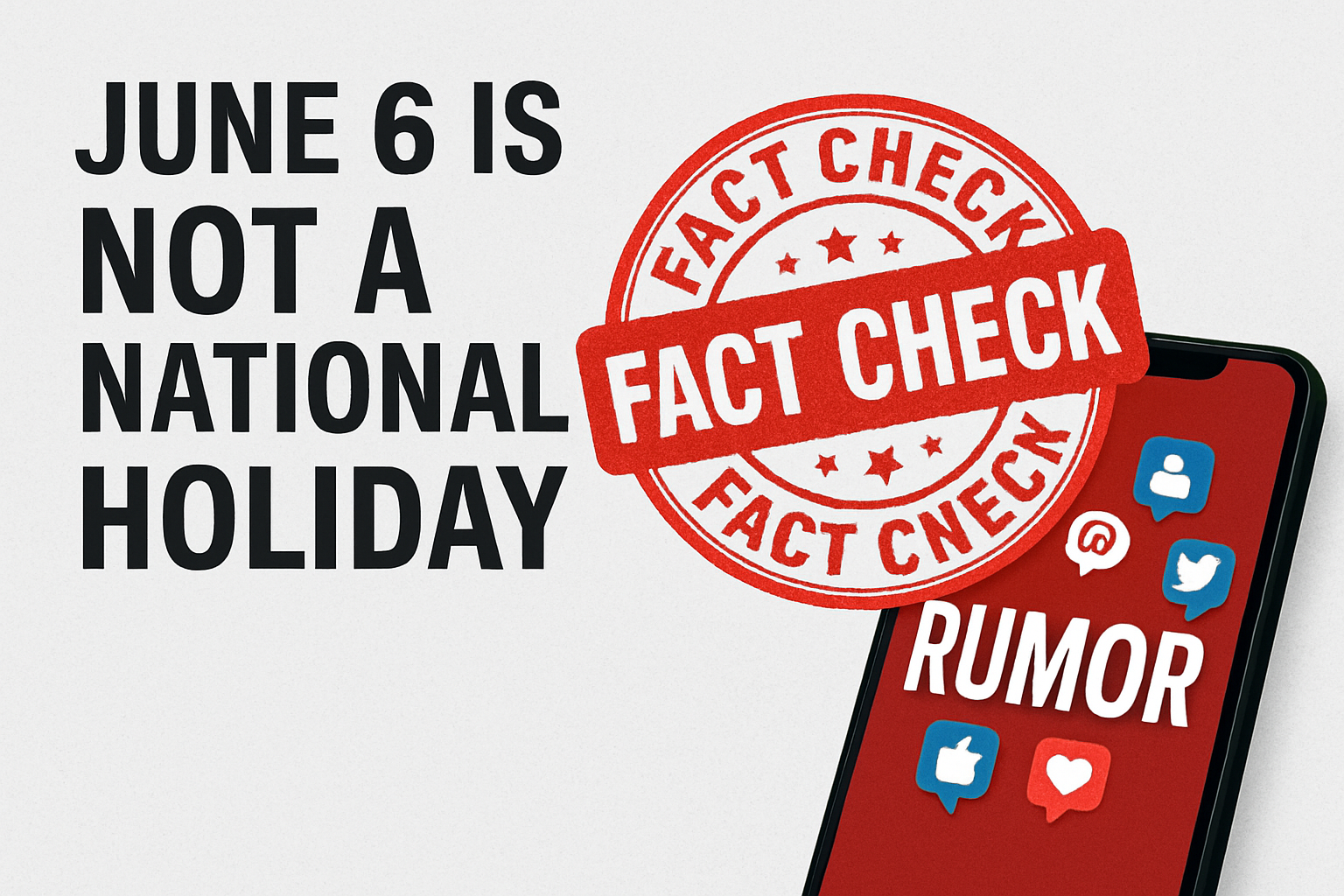
On March 20, 2024, the Government of India officially designated the Press Information Bureau’s (PIB) Fact Check Unit (FCU) as the authorized fact-checking body under the Information Technology (Intermediary Guidelines and Digital Media Ethics Code) Rules, 2021 (IT Rules 2021). This move aims to combat the spread of misinformation related to the Central Government’s activities across digital platforms

Legal Framework and Mandate
The notification, issued by the Ministry of Electronics and Information Technology (MeitY), empowers the PIB FCU to identify and flag online content that is “fake,” “false,” or “misleading” concerning any business of the Central Government. This authority is granted under sub-clause (v) of sub-rule (1) of Rule 3 of the IT Rules 2021
Operational Scope
Established in November 2019, the PIB FCU’s primary objective is to deter the creation and dissemination of fake news and misinformation pertaining to the Government of India. The unit actively monitors, detects, and counters disinformation campaigns, ensuring that false information about the government is promptly exposed and corrected
Implications for Digital Platforms
Under the IT Rules 2021, intermediaries like social media platforms are obligated to make reasonable efforts to not host or publish information that has been identified as false by the government’s fact-check unit. Failure to comply may result in the loss of “safe harbour” protections, which shield platforms from liability for user-generated content
Public and Legal Reactions
The notification has sparked debates concerning press freedom and potential censorship. Critics, including the Editors Guild of India and the News Broadcasters & Digital Association, argue that granting the government authority to determine the veracity of information could suppress dissent and legitimate criticism
Legal challenges have been mounted against the notification. Notably, comedian Kunal Kamra filed a petition in the Bombay High Court, contending that the amendments could be used to silence government critics under the guise of combating fake news .
The Supreme Court of India has since stayed the Union Government’s notification on the PIB Fact Check Unit, citing concerns over freedom of speech and expression .
Conclusion
The formal notification of the PIB’s Fact Check Unit under the IT Rules 2021 represents the government’s intensified efforts to address misinformation related to its operations. However, the move has ignited significant discourse on the balance between combating fake news and upholding democratic freedoms. As legal proceedings continue, the ultimate impact of this development on India’s information ecosystem remains to be seen.
Bollywood
No ₹3 Lakh Fine or 2-Year Jail: The Truth Behind the ‘Hakla’ GIF Buzz

The Reality Behind the ‘Hakla’ GIF Legal Rumor
What is the ‘Hakla’ GIF and Why It Went Viral
The so-called “Hakla” GIF is a meme that has been circulating on social media platforms for years. It features a stammering clip—often with Shah Rukh Khan’s face edited in—that mocks speech hesitations. The meme’s tone is ableist, as it ridicules people with speech disabilities.
The clip has been used widely in WhatsApp stickers, Instagram stories, and Twitter reactions, making it a part of meme culture, even though many find it offensive.

How the ₹3 Lakh Fine and Jail Claim Started
In late July 2024, a satirical social media page called aaandtv posted a humorous “public announcement” stating: Using the Hakla GIF on any social media platform will now attract a fine of ₹3 lakh and up to 2 years imprisonment.
The post carried a disclaimer that it was purely for entertainment purposes. However, as is often the case on the internet, many people shared screenshots without the disclaimer, making it appear like an actual government notification.
Within hours, the claim went viral, with hashtags like #HaklaGIFBan and #3LakhFine trending on Twitter and Instagram.
The Legal Reality — No Such Law Exists
After the rumor exploded, fact-checkers and media outlets stepped in to clarify:
- There is no official government order banning the ‘Hakla’ GIF.
- No new law has been passed imposing a ₹3 lakh fine or 2 years imprisonment for using it.
- India does not have a cyberlaw that explicitly criminalizes sharing specific memes, unless they fall under harassment, hate speech, or defamation.
While the Rights of Persons with Disabilities Act, 2016 prohibits discrimination against persons with disabilities, it does not prescribe automatic fines and jail for sharing online memes unless a case is filed and proven in court.

Could Posting Such a GIF Still Get You in Trouble?
Technically, yes — but not in the way the viral post claimed.
- If a person with a speech disability were to file a legal complaint claiming harassment or defamation, the case could be pursued under IPC Section 499 (Defamation) or Section 500 (Punishment for Defamation), and possibly under Section 66A of the IT Act (though partially struck down).
- However, such cases are rare and would be judged individually — not automatically punished with a fixed fine and jail time.
Why Satire Gets Mistaken for Truth Online
This case is a classic example of how satire without context can morph into “fake news”:
- Social media thrives on screenshots — once a disclaimer is cropped out, satire becomes misinformation.
- The official tone of the joke post made it look like a government press release.
- The public’s general distrust of sudden “online bans” made the rumor believable.

Ethical Side of the Debate
While it’s not illegal per se, the ‘Hakla’ GIF promotes ableism — mocking someone’s disability for humor. Many activists urge people to avoid such content as part of responsible digital behavior.
Social media platforms have also been gradually pushing for more inclusive memes that don’t rely on ridiculing disabilities.
The Bottom Line
- No new law exists — you will not be fined ₹3 lakh or jailed for 2 years simply for sharing the ‘Hakla’ GIF.
- But — you should still avoid sharing content that mocks disabilities to promote a respectful online culture.
- This incident is another reminder to fact-check viral claims before believing or sharing them.

Fact Check
Don’t Be Misled: No Surya Grahan Will Occur on 2 August 2025

In recent days, several social media platforms have been flooded with claims that a Surya Grahan (solar eclipse) will occur on August 2, 2025, and that it will have major spiritual and scientific implications. Some posts even went viral with fake graphics, “scientific alerts,” and pseudo-astrological predictions.
The messages triggered anxiety and confusion among astrology enthusiasts, religious observers, and curious citizens. However, the truth is quite the opposite — no solar eclipse will occur on August 2, 2025, according to both government agencies and international astronomical data.

What the Rumors Claimed
The fake viral posts claimed:
- A rare solar eclipse would occur on 2 August 2025.
- It would be visible in India and affect daily life.
- Pregnant women should stay indoors during the eclipse.
- “Astrological changes” would occur due to planetary alignments.
These messages were mostly circulated through WhatsApp forwards, Facebook posts, YouTube videos, and some astrology websites with no scientific credibility.
PIB Fact Check: The Official Truth
The Indian government’s PIB Fact Check unit — the official body for countering fake news and misinformation — took swift action and issued a public clarification: A viral message claiming that a Surya Grahan (Solar Eclipse) will occur on 2 August 2025 is misleading and fake. No solar eclipse will occur on that day anywhere in the world.
This statement aligns with astronomical records from global observatories and organizations like NASA and TimeandDate.com, which maintain verified eclipse calendars.
No Eclipse in August 2025 – Here’s What the Experts Say
According to NASA’s official eclipse calendar, the next solar eclipses around that time are:
- March 29, 2025 – A partial solar eclipse, visible from parts of India, Europe, and Asia.
- September 21, 2025 – A total solar eclipse, visible mainly from the Southern Hemisphere (not India).
So, there is no record or prediction of any solar eclipse on August 2, 2025, anywhere in the world.

Why These False Claims Matter
Eclipses have long been tied to myths, rituals, and religious practices in India. Claims about eclipses can influence people’s behaviors — from skipping meals to avoiding going outdoors. In some cases, these rumors:
- Spread fear among pregnant women and the elderly.
- Cause disruption in daily life based on unverified “sutak” periods.
- Drive people toward pseudoscientific beliefs and false rituals.
This highlights why such misinformation must be corrected — and why credible sources must be promoted.

Impact of Such Rumors in India
Historically, eclipse-related rumors have had significant cultural and social consequences in India:
- Schools and temples often shut down based on misinformation.
- Businesses and events are postponed due to eclipse superstitions.
- People skip medications, fasting based on unauthenticated timings.
- Many consult astrologers before making financial or personal decisions during such times.
In this digital age, the reach and speed of false information are greater than ever. That’s why fact-checking and public awareness are essential.
How to Spot Fake Eclipse News
Here are 5 quick tips to verify eclipse-related information:
- Check NASA’s Eclipse Calendar – Official and updated regularly:
- Use TimeandDate.com – Offers detailed local and global visibility data.
- Follow ISRO and Vigyan Prasar – For scientific updates from Indian institutions.
- Avoid chain messages – Most viral WhatsApp forwards are hoaxes.
- Fact Check via PIB – Follow on X (Twitter).
Fact Check
PIB flags misquoted statement on EAM Jaishankar’s remarks about informing Pakistan before Operation Sindoor
The Press Information Bureau’s fact-checking unit has dismissed as “misleading” a social media post claiming that External Affairs Minister S Jaishankar stated India had informed Pakistan about planned strikes on terrorist infrastructure before the start of “Operation Sindoor.”
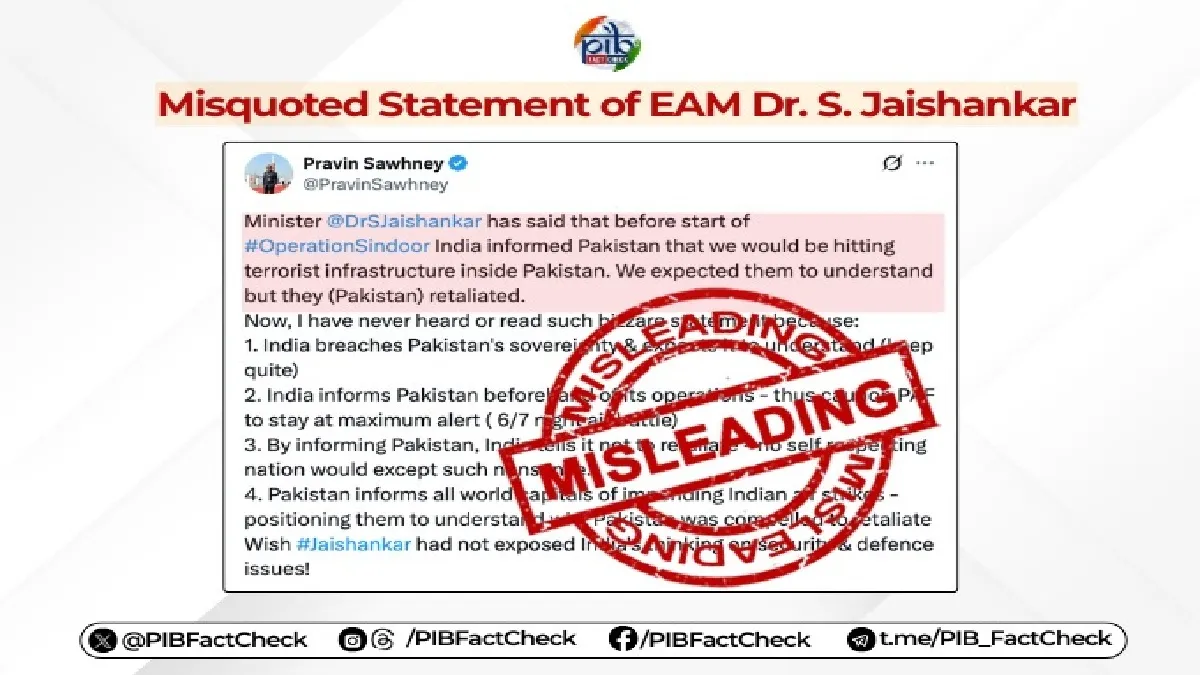
PIB Flags Misleading Claim on EAM Jaishankar’s Remarks About Operation Sindoor
-
A viral social media post falsely attributed a statement to External Affairs Minister S. Jaishankar, claiming India informed Pakistan ahead of its strikes on terrorist infrastructure during Operation Sindoor.
-
The Press Information Bureau (PIB) fact-check unit has categorically denied this claim, calling it misleading.
-
Jaishankar never said India notified Pakistan before the operation — an extremely unlikely scenario given the nature of cross-border counter-terrorism strikes.
-
PIB urged the public to stay alert and avoid spreading unverified or false information.
Context: Pakistan’s Disinformation Campaign Post-Operation Sindoor
-
Following India’s military action on May 7, Pakistan has launched a coordinated disinformation offensive on social media.
-
Pro-Pakistan accounts circulated old images and videos (e.g., a February 2025 IAF Mirage 2000 crash) falsely claiming these were related to the recent operation.
-
Official Indian sources highlighted that this is a deliberate attempt to confuse facts, distort reality, and manipulate public opinion.
-
The misinformation flood aims to make it hard for people to distinguish between truth and fabricated stories of military “victories” or retaliations.
Key Takeaway
This episode illustrates how fake news and misquotes can be weaponized in information warfare — making it critical for everyone to verify before sharing, especially on sensitive national security matters.
-

 Celebrity Lifestyle8 months ago
Celebrity Lifestyle8 months agoEx-Cricketer Shikhar Dhawan Buys Ultra-Luxury Apartment Worth ₹69 Crore in Gurugram
-
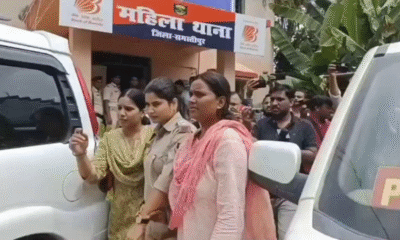
 Crime & Investigation6 months ago
Crime & Investigation6 months agoDelhi Police SI Neetu Bisht Caught Taking ₹20 Lakh Bribe – Shocking Details Emerge in Corruption Probe
-
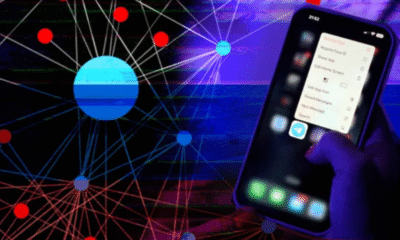
 Glamour & Entertainment7 months ago
Glamour & Entertainment7 months agoTelegram Channels Disseminating Pro‑Russian Propaganda in Poland
-

 Entertainment7 months ago
Entertainment7 months agoAbhijeet & Dr Tarika Reunite in CID 2 — Fans Say ‘Clear the Misunderstanding Now
-

 Business7 months ago
Business7 months agoAmazon sets 30‑day relocation deadline for corporate staff—opt out by resigning in 60 days
-

 Bollywood6 months ago
Bollywood6 months agoNo ₹3 Lakh Fine or 2-Year Jail: The Truth Behind the ‘Hakla’ GIF Buzz
-
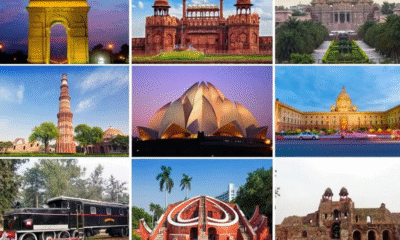
 Travel & Adventure7 months ago
Travel & Adventure7 months agoBest Places to Hangout in Delhi (2025): Top 10 Picks for Fun & Chill
-

 News7 months ago
News7 months agoWar Intensifies: Iran’s Nuclear Sites, Hospitals Hit in Escalating Israel Clash – 10 Big Developments








